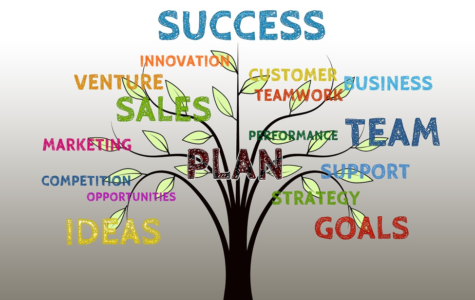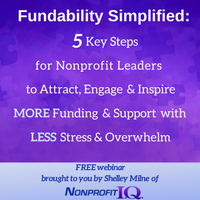Myth # 2: Creating Success is Hard Work
Most of us are taught that to become successful, we must work really hard, often sacrificing our free time, personal relationships, etc. Believe me, I have no problem with hard work. But, hard work is only part of the equation. Hard work by itself does not create success. If it did, every single parent, every housecleaner, landscaper and teacher would exemplify what it means to be successful. Sadly, that is just not the case in our society.
The world has no shortage of people who are hard-working and poor or who are hard-working and miserable. Wouldn’t you agree? In fact, many of the good people served by our nonprofits are some of the hardest working people out there. There are single moms and dads working 2 or 3 hard labor jobs just to put food on the table for their children. Many hard-working people lack peace, happiness and success in their lives.
Did you know that there are the countless nonprofit leaders – executive directors, management staff, board members, etc. – who work constantly, abandon their personal lives, and still continue to struggle just to make ends meet. If this sounds like you or anyone you know, listen up! Are you ready for a mind blowing revelation?
 It really doesn’t have to be that hard! Now, if you’re one of those people who have given up their lives in the service of others to address your life’s mission and are committed to the thought that personal sacrifice is noble, take a moment to really let that sink in. Let me say it again. IT DOESN’T REALLY HAVE TO BE THAT HARD!
It really doesn’t have to be that hard! Now, if you’re one of those people who have given up their lives in the service of others to address your life’s mission and are committed to the thought that personal sacrifice is noble, take a moment to really let that sink in. Let me say it again. IT DOESN’T REALLY HAVE TO BE THAT HARD!
Defining Success
I think we also need to make a critical distinction here because “success” is a highly subjective term. What do I mean by that? Well, my personal definition of success includes all of the following items (in no particular order):
- Enjoying good health for myself and my family
- Being a good wife and mother and enjoying mutually loving and respectful relationships with my family
- Having a business that helps people create more positive change in the world
- Liking who I am as a human being
- Having ample time to have fun and enjoy my life with family and friends on a frequent basis
- Having a home that I love where my family and I feel comfort, peace and joy
- Bringing in enough income to live a happy, comfortable lifestyle, travel, have fun and give back to the community
All of these things are components of my personal definition of success. Success to someone else, however, may look much different. A corporate CEO, for example, may define success as being wealthy and powerful. And, a NP Executive Director may define success as having ample funding to sustain and grow their organization and programs, having good staff and board members who are eager and excited to help work toward the organization’s mission and goals; having a good balance between their professional and personal life, and serving their community/constituents in the way that is truly needed. While success for all of us may differ, that does not mean that one definition is right and the others are wrong. They’re simply different.
 Before you can analyze where you are on the success spectrum, I invite you to spend some time thinking about your own definition to success. What does it mean for you to be truly successful? Are you judging your own success based on other people’s definitions? That’s a big one for a lot of people. Oftentimes, we judge ourselves based on our parents’ or society’s standard for success. Then, we kick our own butts when we fail to live up to those unrealistic or even irrelevant expectations. What are your priorities? How do you know when you’re being successful?
Before you can analyze where you are on the success spectrum, I invite you to spend some time thinking about your own definition to success. What does it mean for you to be truly successful? Are you judging your own success based on other people’s definitions? That’s a big one for a lot of people. Oftentimes, we judge ourselves based on our parents’ or society’s standard for success. Then, we kick our own butts when we fail to live up to those unrealistic or even irrelevant expectations. What are your priorities? How do you know when you’re being successful?
A Different Perspective
Success can be simple. Nonprofit success is a formula. There are certain things you need to have in place if you want your nonprofit not just to SURVIVE, but to really THRIVE in this competitive and ever-changing market.
 Did you know that our minds play tricks on us? It’s human nature to deceive ourselves into thinking that things are much more difficult than they really are. Then, we often unwittingly gather “evidence” to support that assertion. This evidence may include staff and/or board members who are disinterested, unhelpful or even resistant. It may include the fact that the organization struggles from year-to-year (or maybe from month-to-month) just to sustain the programs and services that they already have, and therefore they cannot even fathom the possibility of growth or the possibility of creating sustainability in their organizations. Other evidence might be that you have lost your enthusiasm and passion for their work because they feel overworked, overwhelmed and underappreciated.
Did you know that our minds play tricks on us? It’s human nature to deceive ourselves into thinking that things are much more difficult than they really are. Then, we often unwittingly gather “evidence” to support that assertion. This evidence may include staff and/or board members who are disinterested, unhelpful or even resistant. It may include the fact that the organization struggles from year-to-year (or maybe from month-to-month) just to sustain the programs and services that they already have, and therefore they cannot even fathom the possibility of growth or the possibility of creating sustainability in their organizations. Other evidence might be that you have lost your enthusiasm and passion for their work because they feel overworked, overwhelmed and underappreciated.
We can find evidence to support any story that we tell ourselves. So what if you were to change your story? Can it be that easy? YES!!! The trick is getting your subconscious to believe that story because once your subconscious believes it, it will find the evidence for you to prove that your new story is true. Until then, you must continually look for that evidence and remind your subconscious of your new thoughts until they become habits and belief
Create a New Story
What if you decided that your new story is that you are happily working to engage and inspire those who truly believe in your organization’s mission and are really excited and eager to help in whatever capacity they can.
What if your story became that fundraising is simply an avenue to help engage those people at a deeper level and that once you found the right jobs or activities that spoke to their values and utilized their strengths, knowledge, skills, and interests, the game of fundraising all of a sudden becomes much easier?
What if you changed the story from fundraising is a necessary evil to fundraising is actually FUN?
Put Your Knowledge to Action
- Take stock of all of your limiting thoughts and beliefs – write them down.
- Go through each one and reframe the story – write that down too.
- Make it a habit to read through your new stories daily (at least) and utilize any additional tools and techniques at your disposal to help ingrain those new stories into your psyche. Some people use affirmations, subliminal messages, or various other brain retraining techniques.
- When you believe your new stories, watch how the world then begins conspiring to support them.
Want More Strategy & Support?
 If you like what you’ve been reading so far and want to speak to Shelley personally to help you identify the Best Next Moves for your nonprofit, Shelley is giving away complimentary Nonprofit Strategy Calls for a very limited time. These free calls are intended for leaders (Executive Directors and board leaders) from small to mid-sized nonprofits who are ready to learn how to improve your organization’s efficiency, effectiveness and fundability and FINALLY position your organization for ongoing success and sustainability.
If you like what you’ve been reading so far and want to speak to Shelley personally to help you identify the Best Next Moves for your nonprofit, Shelley is giving away complimentary Nonprofit Strategy Calls for a very limited time. These free calls are intended for leaders (Executive Directors and board leaders) from small to mid-sized nonprofits who are ready to learn how to improve your organization’s efficiency, effectiveness and fundability and FINALLY position your organization for ongoing success and sustainability.
Whether you’re struggling for funding or you just want to figure out how to serve your community and/or constituents much more powerfully, fill out the form from the link below. Upon submitting your form, you’ll be sent a link to schedule your Nonprofit Strategy Call with Shelley.



